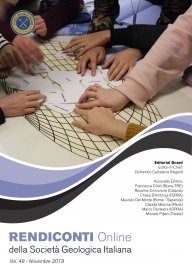
WASTEBERG: a didactic activity about waste and sustainable use of georesources in relation to the Agenda 2030
Lucia Stacchiotti (1), Alessandro Acqua (1), Daniela Pennesi (1), Alessandra Beccaceci (1,2) & Eleonora Paris (1)
(1) School of Science and Technology, Geology Division – University of Camerino, Italy (2) Istituto Comprensivo "Via Ugo Bassi" - Civitanova Marche, Italy
Corresponding author e-mail: lucia.stacchiotti@unicam.it
DOI: https://doi.org/10.3301/ROL.2019.62
Volume: 49/2019
Pages: 127-133
Abstract
Nowadays, the Agenda 2030 for Sustainable Development is a key concept to be introduced in the Environmental Education at all school levels. Therefore, it is important that Science Curricula will be integrated with didactic paths, in order to make students approach the topics of the Agenda, making them easier to understand and suitable to be treated in classes of different grades.
Geosciences can offer fruitful opportunities for the realization of many multidisciplinary teaching activities related to the Sustainable Development. here we present a didactic activity about waste and circular economy, in line with Agenda 2030, which has been realized for 14-years-old students and tested both in the class and with a group of teachers. In the activity, topics like georesources, ore deposits, mining are approached, to explain the life cycle of packaging materials. The Wasteberg, a term firstly introduced by Young and Sachs (1994), was used here to name the activity, which was implemented from to the original concept to build an articulated didactic plan. By taking into consideration different types of packaging wastes, made of aluminum, glass, plastics and paper, the aim of the activity is to make the students understand that what is beyond common household waste can be represented by the shape of an iceberg. By using a familiar comparison, the objective of the activity was to attract the interest of students, increasing their understanding and awareness about non- renewable resources and sustainable development, by making them focus on resources consumption and the energy flow behind any productive processes.
Pupils, divided in groups, worked following the Inquiry Based Science Education approach (IBSE). The activity was carried out using also interdisciplinary aspects, involving in the experience the teachers of math, history, geography and technology. As a final outcome, the class determined the economic and environmental advantages that can be obtained by recycling waste materials.
Keywords
Get Full Text